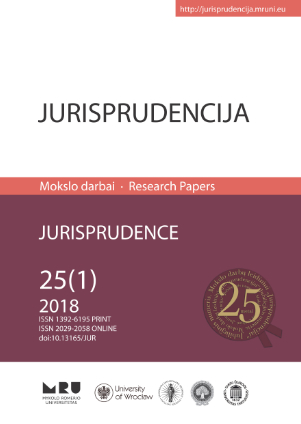INFORMACIJOS APIE KILMĖS VALSTYBĘ PAIEŠKA IR JOS NAUDOJIMAS PRIEGLOBSČIO BYLOSE
RESEARCHING COUNTRY OF ORIGIN INFORMATION AND THE USE OF IT IN ASYLUM CASES
Author(s): Laurynas Biekša, Ilona Ivašauskaitė, Eglė SamuchovaitėSubject(s): Law, Constitution, Jurisprudence
Published by: Mykolas Romeris University
Keywords: country of origin information; asylum procedure; asylum qualification; benefit of doubt; credibility;
Summary/Abstract: The article examines the main rules concerned with researching and using country of origin information in asylum cases. A principle of refugee law known as the “benefit of doubt” shows that it is not possible to examine an asylum case without taking into account country of origin information. Processing country of origin information is the major element of each asylum procedure, which requires much time andneeds to be started at the very beginning of each asylum case.A lot of recent national and international research has been specifically focused on this element of asylum cases and has provided useful guidelines and criteria for processing country of origin information. The authors of this article cover the key findings of the main national and international research performed in this field, and propose to offer advice on how to apply the best methodology for dealing with country of origin information in legal practice. The authors consider the Austrian Centre for Country of Origin and Asylum Research and Documentation (ACCORD) as the top experts in this field and endorse many of the recommendations found in its manual. The European Asylum Support Office (EASO) also provides valuable guidelines for COI research, and the EASO COI Portal is becoming very useful for legal practitioners. The authors also pay attention to the relevant legal provisions of the EU directives and the legal acts of Lithuania regulating the legal requirements for using country of origin information in asylum cases. The recommendations of the UNHCR are also taken into account.A separate part of the article is dedicated to the quality requirements for assessing country of origin information in asylum cases. Important principles such as relevance, reliability and balance, accuracy and validity, transparency and traceability are presented in this part. One of the main practical conclusions of this article is that it recommends the research of country of origin information from different sources, because usually there is no such source, which would be absolutely objective or absolutely subjective. Different sources usually choose different preferences to elaborate on or to store different information, but it is quite rare that the information is intentionally false. Therefore, the full picture of country of origin information might only be seen if different sources were assessed together. Such a full picture allows the sources to cover any gaps in the information of each other, and allows an asylum lawyer to effectively apply the quality requirements for assessing country of origin information.
Journal: Jurisprudencija
- Issue Year: 25/2018
- Issue No: 1
- Page Range: 115-132
- Page Count: 18
- Language: Lithuanian

